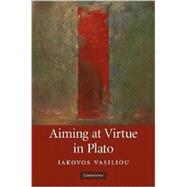
Note: Supplemental materials are not guaranteed with Rental or Used book purchases.
Purchase Benefits
Looking to rent a book? Rent Aiming at Virtue in Plato [ISBN: 9780521862967] for the semester, quarter, and short term or search our site for other textbooks by Iakovos Vasiliou. Renting a textbook can save you up to 90% from the cost of buying.
| Acknowledgements | p. ix |
| Introduction | p. 1 |
| Aiming and determining | p. 1 |
| Virtue, aims, and eudaimonia | p. 4 |
| Disputes about virtue and its supremacy | p. 6 |
| Socrates and Plato on virtuous actions and virtuous characters: A standard account | p. 10 |
| A brief overview of some central principles | p. 15 |
| A note on reading Plato (I): The significance of the dialogue form | p. 18 |
| A note on reading Plato (II): Doctrines and developmentalism | p. 20 |
| Socrates and the supremacy of virtue | p. 22 |
| Introduction | p. 22 |
| The supremacy of virtue in the Apology | p. 24 |
| Socrates and moral knowledge | p. 27 |
| SV and the priority of definition | p. 36 |
| Socrates' criticism of his fellow Athenians | p. 39 |
| Socratic incontinence | p. 42 |
| Determining virtue in the here and now: Socrates in the Apology and Crito | p. 46 |
| Ill-fitting remarks in the Apology | p. 48 |
| The role of Socrates' divine sign and his decision to avoid public life | p. 51 |
| Crito's appeal | p. 56 |
| Socrates' response | p. 63 |
| SV in the Crito | p. 71 |
| The Laws' starting assumptions | p. 74 |
| The arguments of the Laws | p. 77 |
| The supremacy of virtue in the Gorgias | p. 91 |
| The Gorgias and SV | p. 91 |
| Socrates and rhetoric in the Gorgias | p. 93 |
| Gorgias, Socrates, and SV | p. 98 |
| Polus and SV | p. 108 |
| Callicles and his conception of justice | p. 117 |
| Callicles' protreptic | p. 122 |
| Callicles' hedonism | p. 128 |
| Socrates as rhetor | p. 133 |
| Trying (and failing) to determine what virtue is | p. 137 |
| Two commonalities | p. 138 |
| The dialogues of definition and the "What is F?" question | p. 140 |
| Aiming and determining in the Euthyphro | p. 145 |
| Aiming and determining in the Protagoras and Euthydemus | p. 160 |
| Socrates and Thrasymachus: Republic I | p. 166 |
| Socrates, Cephalus, and Polemarchus | p. 167 |
| Thrasymachus' initial account of justice | p. 172 |
| Thrasymachus' "definitions" of justice | p. 175 |
| Cleitophon's recommendation | p. 178 |
| Aiming and determining in the "Thrasymachus episode" | p. 182 |
| Socrates' defense of SV in Republic 1 | p. 187 |
| The benefits of injustice | p. 192 |
| Defining justice and the project of the Republic | p. 192 |
| The classification of goods | p. 194 |
| Understanding Glaucon's example | p. 201 |
| The origin of justice according to the many | p. 203 |
| The benefits of injustice | p. 206 |
| Early education and non-philosophers in the Republic | p. 212 |
| Overview | p. 212 |
| The significance of early education | p. 215 |
| A tension in the account of early education | p. 219 |
| Philosophers and non-philosophers in the Republic | p. 232 |
| Aiming at virtue and determining what it is | p. 247 |
| Just actions and the just soul in Republic 4 | p. 247 |
| Just persons | p. 254 |
| The virtue of non-philosophers | p. 259 |
| The promise of an answer to determining questions | p. 267 |
| The role and significance of Books 8 and 9 | p. 272 |
| Epilogue | p. 282 |
| Bibliography | p. 286 |
| Index locorum | p. 295 |
| General index | p. 305 |
| Table of Contents provided by Ingram. All Rights Reserved. |
The New copy of this book will include any supplemental materials advertised. Please check the title of the book to determine if it should include any access cards, study guides, lab manuals, CDs, etc.
The Used, Rental and eBook copies of this book are not guaranteed to include any supplemental materials. Typically, only the book itself is included. This is true even if the title states it includes any access cards, study guides, lab manuals, CDs, etc.